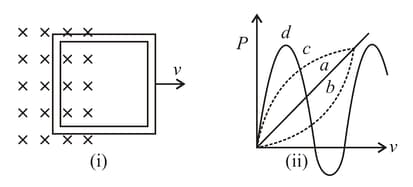B M Sharma Solutions for Chapter: Electromagnetic Induction, Exercise 3: DPP
B M Sharma Physics Solutions for Exercise - B M Sharma Solutions for Chapter: Electromagnetic Induction, Exercise 3: DPP
Attempt the free practice questions on Chapter 3: Electromagnetic Induction, Exercise 3: DPP with hints and solutions to strengthen your understanding. Chapterwise/Topicwise Daily Practice Problems (DPP) Magnetism and Electromagnetic Induction JEE Main & Advanced solutions are prepared by Experienced Embibe Experts.
Questions from B M Sharma Solutions for Chapter: Electromagnetic Induction, Exercise 3: DPP with Hints & Solutions
A metallic square loop is moving in its own plane, with velocity , in a uniform magnetic field perpendicular to its plane as shown in the figure. An electric field is induced:
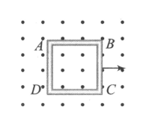
The figure shows four wire loops with edge lengths which are either or . All four loops will move through a region of uniform magnetic field (directed out of the page) at the same constant velocity. Rank the four loops according to the maximum magnitude of the emf induced as they move through the field.

At a place, the value of horizontal component of the earth's magnetic field is . A metallic rod of length placed in east-west direction, having the end A towards east, falls vertically downward with a constant velocity of . Which end of the rod becomes positively charged and what is the value of induced potential difference between the two ends?
Consider the situation shown in the figure. The wire is sliding on the fixed rails with a constant velocity. If the wire is replaced by semi-circular wire, the magnitude of the induced current will:
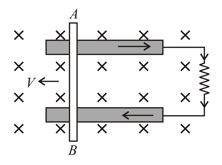
A straight wire of length is bent into a semicircle. It moves in a uniform magnetic field with speed and diameter perpendicular to the field. The induced emf between the ends of the wire is,
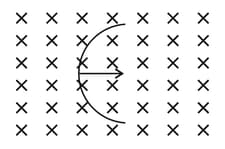
A conductor moves along its bisector with a velocity of through a perpendicular magnetic field of , as shown in the figure. If all the four sides are of length each, then the induced emf between points and is,
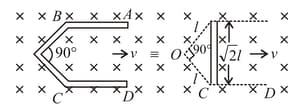
As shown in the figure, a metal rod makes contact and completes the circuit. The circuit is perpendicular to the magnetic field, . If the resistance is , the force needed to move the rod, as indicated with a constant speed of is,
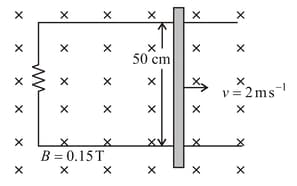
Figure shows a conducting loop being pulled out of a magnetic field with a speed . Which of the four plots, shown in figure , may represent the power delivered by a pulling agent as a function of the speed ?
